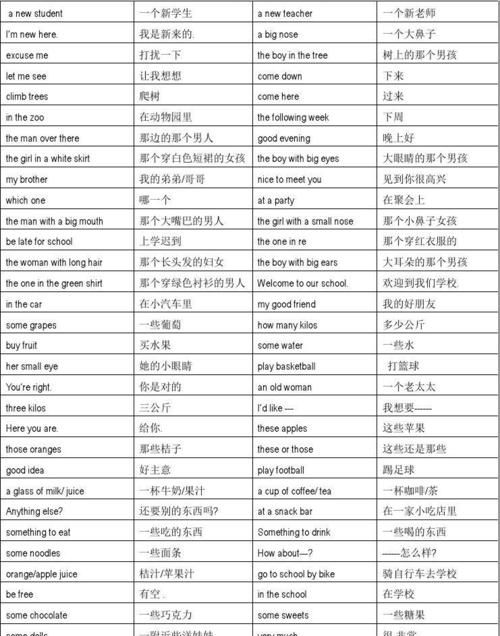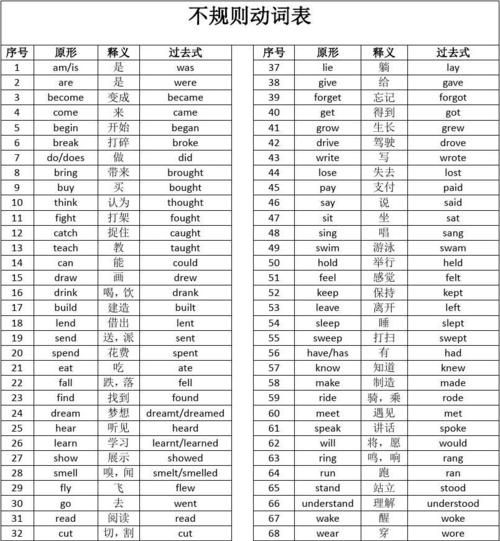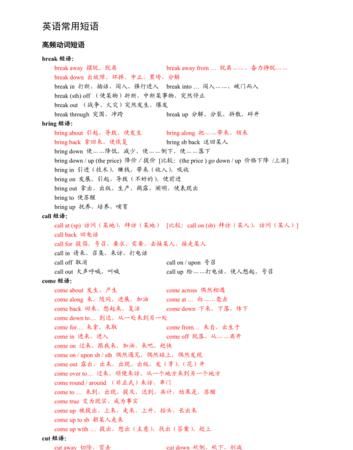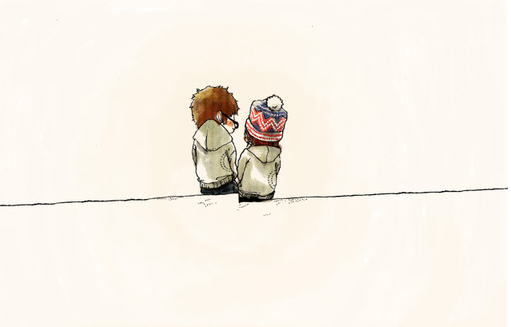本文目录
小学生英语常见的动词有哪些?
clean the floor 扫地
clean the house 打扫房间
collect stamps 集邮
come back 回来
come from 来自……
come here 来这里
come in 进来
come on 过来/加油
come to tea 来喝茶
cook the meal 煮饭
crash into 撞向
dig a hole 挖坑
do housework 做家务
do morning exercises 晨练
do one’s homework 做作业
do some reading 读点书
do sports 做运动
draw a picture 画画
drink some water 喝些水
drive a car 驾车
fall over 跌倒
fill the hole with earth 用泥土填坑
get off 下车
get out of 走出(……之外)
go and have a look 去看一看
go back 回去
go boating 去划船
go fishing 去钓鱼
go for a walk 去散步
go home 回家
go on a diet 节食
go out 出去
go shopping 去购物
go sightseeing 去观光
go skating 去溜冰
go skiing 去滑雪
go straight on 直走
go swimming 去游泳
go to bed 去睡觉
go to school 去上学
go to the cinema 去看电影
go to work 去上班
have a bath 洗澡
have a Chinese lesson 上语文课
have a cold 感冒
have a fever 发烧
have a good time 玩得开心
have a headache 头痛
have a look 看一看
have a picnic 举行野餐活动工
have a rest 休息
have a stomachache 胃痛
have a tooth-ache 牙痛
have a trip 去旅游
have a try 试一试
have been to 到过
have breakfast 吃早餐
have fun 玩得开心
have lunch 吃午饭
have some coke 喝些可乐
have supper/dinner 吃晚饭
have time 有时间
just a minute 等一下
just now 刚才
keep a diary 记日记
let me see 让我想一想/让我看一看
listen to music 听音乐
listen to the CDs 听CD 碟
listen to the radio 听收音机
make friends 交朋友
make the bed 整理床铺
mark the pupils’ homework批改作业
next to 下一个
no problem 没问题
paint a picture 涂画
pick up 捡起
plant trees 种树
play badminton 打羽毛球
play basketball 打篮球
play cards 打牌
play football 踢足球
play games 玩游戏
play table tennis 打乒乓球
play tennis 打网球
play the guitar 弹吉他
play the piano 弹钢琴
put away 放好
put on 穿上
put the tree into the hole 把树放进洞里
ride a bike 骑自行车
see a film 看电影
surf the Net 上网
take a message 传递信息
take exercise 进行锻炼
take medicine 服药
take off 脱下
take photos 照相
turn off 关闭
turn on 打开
wait a moment 稍等一下
wait for 等候
wash clothes 洗衣服
wash dishes 洗碟子
watch a football match 看足球赛
watch TV 看电视
water the flower 浇花
water the tree 浇树
write a letter 写信

常用的英语动词短语有多少
1.be known as/be famous as作为……而闻名
be known for因……而出名
be known to为……所知
be known by凭……而知
The hill is known for the temple.
LuXun is known to us as a writer.
One can be known by his words and deeds.
2.be married to与……结婚
She is married to a musician. ..
3.be tired of/with对……厌烦
He is tired of/with this kind of life.
=He is bored with this kind of life.
4.be terrified at被……吓一跳
He is terrified at the snake.
5.be burdened with负重
He is burdened with a heavy load.
6.be crowded with挤满
The shop is crowded with people.
7.be dressed in穿着
She is dressed in red.
8.be experienced in对……有经验
He is experienced in mending bikes.
9.be equipped with装备
They are equipped with guns and food.
10.be furnished with提供,布置
They are furnished with enough food.
11.be engaged in sth从事,忙于(=be busy with sth)
He has been engaged in writing novels.
12.be engaged to与……订婚
My daughter is engaged to a nice doctor.
13.be about to do sth.正要做……
I was just about to go swimming when our guide saw me and stopped me.
14.be fit to do/be fit for胜任;适合于
He is fit to do the work.
These books are not fit for children.
15.be worth doing值得做……
The film is worth seeing again.
16.be proud of以……而自影骄傲
I am proud of being a Chinese.
17.be used to sth./doing sth.习惯于……
My grandpa is not used to living in the noisy city
18.be content to do sth./with… 甘愿于干……;满足于……
I am content with your work this time.
19.be content with对……感到满意
You should be content with what you have
20.be up to应由……,轮到……
It's up to her to answer the question.
21.be meant/intended for打算给,打算用作
Is this valuable painting meant for me?
22.be connected with与……有联系
He was also connected with the government.
23.be crazy about对……狂热
Many young people are crazy about Hip-Hop.二、动词break构成的短语动词
1.break out爆发
The Anti—Japanese War broke out in 1937.
2.break in打断;闯入
Two robbers broke in and robbed the bank of a lot of money.
3.break into闯入;破门而入
They broke into the uncle’s bedroom and found the man lying on the floor。dead.
4.break away from脱离
Lincoln said it was not fight for the south to break away from the union.
5.break down(机器,车辆)坏了;失败了;摧毁;分解
We are sorry to arrive late.but the car broke down.
6.break through突破
The marchers broke through the line of the police.
7.break off折断;中断;断绝
Let’s break off for half an hour and have some tea.
8.break up驱散,拆散
The police broke up the crowd.三、动词carry构成的短语动词
1.carry on进行
He had learned enough English to carry on a conversation
2.carry out执行;进行
They were carrying out an important experiment.
3.carry away拿走
Please carry these desks away.
4.carry off夺走,抢走
Some unknown man carried off the prize四、动词call构成的短语动词
1.call on拜访某人,号召
We will call on Mr.Li tomorrow.
We are called on to help those in trouble.
2.call at拜访某地
I called at your office yesterday, but you were not in
3.call for需要;要求;邀约(人);取(物)
Success called for hard work.
call for a doctor去请医生
4.call in 请来;收回
Mother is badly i11.so call in a doctor at once.
5.call up打电话;征召;回想起
I called Tom up and told him the news.
In most countries men are called up at the age of 18.
As I grew up in a small town at the foot of a mountain, the visit to the village called up scenes of my childhood.
五、动词catch,hold构成的短语动词
1.catch/take/get hold of sth.抓住某物
Catch/Get/Take hold of the rope.and I'll pull you up.
2.catch up with赶上
Work hard and I gin sure you are able to catch up with others in class.
3.catch fire着火;烧着
Last night a big building caught fire.
4.catch sight of发现;看到
When the mice caught sight of the cat,the mice run away as quickly as possible.
5.hold up举起;阻滞(交通等);耽搁
He held up one of his fingers and showed it to the class.
In the rush hour the traffic is hold up.,.
6.hold back阻止;控制
We must hold them back from fighting.
7.hold one’s breath憋住气,屏息
How long can you hold your breath under water?
8 hold out坚持;拿出
We must hold out until help comes.
六、动词come构成的短语动词
1.come into…进入……状态
come into being(事物、局面等)产生;形成
The custom came into being long long ago.
2.come along过来;快点
Come along! It’s nearly eight o'clock.
3.come out出来;出版
How did the printing come out?
4.come true实现
I am sure your dream will come true one day.
5.come back to life苏醒过来
When the wounded soldier came back to life,he found himself in hospital.
6.come to the point说到要点,触及问题实质
7.come about发生,造成
The event came about as he had predicted it.
8.come across碰见
You’re the most beautiful woman I've ever come across.
同义词组:run across
I came across an old friend in the street.
9.come to all end结束
Your duties here have come to an end.
10.come to light为人所知,显露
The robbery didn’t come to light until the next day
11.come up with提出,想出
He came up with a new suggestion七、动词do构成的短语动词
1.do well in在某方面做得好
My cousin is a sailor and he is doing very well in the navy
2.do good to对……有好处
Doing morning exercises will do good to your health.
3.do harm to对……有害处
Too much noise does harm to our health.
4.do with处理
What did you do with our goods?
5.do sb.a favour帮某人的忙
Will you do me a favour to carry it upstairs?
6.do up系纽扣;梳理
Look,your bottom isn’t done up.
do up one’s hair梳理头发
八、动词get构成的短语动词
1.get in touch with同……取得联系
2.get up起床
He gets up very early every day.
3.get back回来;取回
1 will get back next weekend.
4.get on上车
You shouldn’t get on the bus until it has stopped completely
5.get over克服;度过
You’ll soon get over these difficulties.
6.get off下车
The bus stopped and the passengers got off.
7.Get together相聚
We should go to a restaurant to get together.
8.get on/along well with与……相处融洽
I am getting on well with my classmates.
9.get into进人;陷入
Don’t get into the habit of smoking.
10.get into trouble陷入麻烦
11.get in a word插话
12.get rid of除掉
We aye doing our best to get rid of pollution.
13.get through通过;接通;完成;经历
I tried to telephone you but I couldn’t get through.
1 will be with you as soon as I get through this work
14.get to到达
He had to get to the other side of street to attend a meeting
15.get about/around/round传开,传出去
The news of the disaster soon get about.
16.get across使理解
The teacher tried to explain the problem,but the explanation did not get across to the class.
17.get away离开
1 was in a meeting and couldn’t get away.
18.get down to(doing)sth.安心做,开始认真干
You must get down to your studies this year.九、动词give构成的短语动词
1.give up放弃
I persuaded him to give up the foolish plan.
2.give in屈服;投降
He wouldn’t give in to the enemy.
3.give out用完;耗尽
Our food and water will give out soon.
4.get out of从……出来,摆脱,
He got out of debt.
5.give away分发;捐赠;泄露
He gave away most of his fortune to the poor work
Please don’t give my secret away.
6.give off放出
This engine gives off lots of smoke and steam
7.give back归还;恢复
Living here has given me back my health.十、动词go构成的短语动词
1.go ahead继续;干吧
He went ahead with the work and got it done.
一May I use your phone?
---Certainly.Go ahead.
2.go by(时间)过去;经过(地点)
Don’t let the good chance go by.
3.go out(灯、火)熄灭
When they arrived,the fire had gone out.
4.go on(doing)继续做某事
Please go on with your work.
5.go on to do sth.接着做另外的事
He went on to watch TV after he had finished his home一
6.go over检查;复习
When I came into the teacher's room,our teacher is going over our homework.
7.go through完成;通过;经历;仔细检察
During the night the computers go through the information.
She went through one hardship after another.
Mother went through the drawer looking for the sweater.
I've gone through too much money this week.
8.go all out(=try/do one’s best)竭尽全力
They went all out to build the dam.
9.go about开始着手,到处走动,传开
How does one go about getting the information.
10.go against违背
They are going against our wishes.
11.go back回家,追溯
This festival goes back to Roman times.
12.go for运用于,应用于’
The medicine went for nothing.
13.go in for参加,爱好
She went in for a singing competition.
14.go with相配
I want some shoes to go with these trousers.
15.go without不吃/喝/用
The poor boy often has to go without supper.
16.go beyond超过
That’s going beyond a joke.
17.go up上升,上涨
The goods have gone up in quality.
18.go down下降,降沉,下沉
The moon has gone down.

最常用的100个英语动词短语小学
read the letters读信
buy a cake for him为他买个蛋糕
be fine很好
go to school去上学
say hello to sb向某人问好
say goodbye to sb向某人再见
visit my school参观我的学校
look at a photo看图片
welcome to our school欢迎来到我们学校
behind the lake在湖后面
feed the birds 喂鸟
make a note 写笔记
in the zoo在动物园
play football踢足球
between the lakes在湖中间
have an ice cream吃冰淇淋
close the gate 关门
near the left of my house在我房子的左边
on the left of the park在公园的右边
in the middle of trhe playground在操场的中间
play a game玩游戏
on their left在他们左边
pick the flowers摘花
in Tom's school在汤母的学校
at the back of在~~的后面
wake up叫醒
look at the time看时间
want to go to sleep想去睡觉
be nice to sb对人好
be friendly to sb对人友好
be polite to sb.对人礼貌
be helpful to sb.对人乐于助人
chat with each other互相交谈
get a letter from sb.得到来信
hear from sb.得到来信
go home 回家
write a letter写信
have fun得到乐趣
do sport做运动
do exercise做运动
keep a diary写日记
send them to her发它们给他
watch too much TV看太多电视
listen to her听他
want to know想知道
show sb. sth.给某人看某物
e-mail me发邮件给我
practise with my friends与朋友门练习
use sth.to do sth.用某物做某事
go to the school library去校图书馆
make model planes做模型飞机
tell your friends about your school life
walk him带他散步
ask for help寻求帮助
get some imfoemation得到信息
say it again再说一遍
hear sb. well听清楚
have a trip旅行
meet uo with sb.与某人见面
need to pactise it more需要多练
from one to another从这到另一个
organize the class trip组织旅行
teach us English 教我们英语
go to the Computer Club去电脑俱乐部
go to her dancing lesson去他的舞蹈棵
be busy doing sth.忙于某事
on the football field在足球场
at the end of在~~末尾
know a lot about computers知道许多关于电脑
from day to day 日复一日
greet your partners问候你的搭档
use sth.more than once不止一次使用
learn more about the world了解更多世界
borrow your pen 借你的钢笔
every day excpet Mondays每天除了星期一
have no time to do sth.没有时间做某事
like all the lessons喜欢所有课程
start a role-piay开始分角色扮演
start to learn English 开始学英语
be good at擅长
do well in擅长
be clever at擅长
like dancing喜欢舞蹈
in Class1在一斑
in the classroom在教室
wear glasses戴眼镜
look after the e-dog 照顾电子狗
live in Beijing住在北京
make friends叫朋友
read the book读书
on this floor在这层
in Nanjing在南京
in the street在这条街
far from原离
start school开始上学
meet sb.见某人
meet new friends见新朋友
after school放学后
after class下课后
listen to music听音乐
love him very much非常喜欢他
write about yourself写自己
on the badminton court在羽毛球场地
in the swimming pool在游泳池
talk with sb.和某人交谈
eat in a restaurant在餐馆吃饭
at the weekend在周末
on the farm在农场
collect the eggs收集鸡蛋
sing a song唱歌
play for效力
in the next World Cup在下一届世界杯
in Part One在第一部分
in English用英语
in the school Reading Club在英语俱乐部
help you帮助你
work with others合作
at home在家
stick your photo here把你的照片贴在这
sound great听起来好
sweet smell闻起来香
play happily玩得开心
go to clubs 去俱乐部
living place 居住地
on Page 19在十九部分
at school在学校
have a good time玩得开心
do morning exercises做早操
at lunchtime在午餐时间
in the playground在操场
send a e-mail发邮件
watch football games看足球比赛
play badminton打羽毛球
watch TV看电视
play together一起玩
under the tree在树下
at the new school在新学校
look at the posters看海报
be answered被回答
need to 需要
eat nice food吃好的食物
practise saying练习说
inthe Building B在大楼B里
clean the classroom打扫教室
stand up 起立
sit down坐下
more than once不止一次
dress as a ghost打扮成鬼
at 8 p.m在下午八点
make larnters做灯
complate the notes完成笔记
make some notes写笔记
out of出自
hear every thing听见所有
have a holiday 有一个假期
be on holiday度假
see the doctor看病
talk about讨论
at Christmas在圣诞节
be born出生
on Monday在星期一
in May在5月
want a party想要个聚会
finish homework完成作业
buy mooncakes买月饼
have a party举行聚会
look for寻找
in the year在一年里
draw a picture画花
western people西方人
play a game完游戏
write a plan写计划
have to必须
go there去那
open the door开门
close the window关窗
by bike骑车
by bus坐汽车
come from来自
at the shop在商店
play with friends和朋友玩
under the bed在床下
make a card做张卡片
go to my home去我家
watch the moon赏月
have a look看看
have a party举行聚会
buy a cake买蛋糕
buy them买他们
near the school在学校附近
go fishing去钓鱼
go running去跑步
in the morning在早晨
in the afternoon在下午
at night在晚上
in the evening在夜晚
have a car 有一辆汽车
eat dumplings吃饺子
eat the cake吃蛋糕
have a dinner举行晚宴

小学英语动词短语100个
1.get up got up 起床
2.have lunch had lunch 吃午饭
3.go home went home 回家
4.go to bed went to bed 去睡觉
5.go to school went to school 去学校
6.watch TV watched TV 看电视
7.play games played games 玩游戏
8.go to a movie went to a movie 去看电影
9.climb a hill climbed a hill 爬山
10.play the piano played the piano 弹钢琴
11.take a walk took a walk 散步
12.play football played football 踢足球
13.ride a bike rode a bike 骑自行车
14.drink some water drank some water 喝水
15.water flowers watered flowers 浇花
16.play ping-pong played ping-pong 打乒乓球
17.go to the park went to the park 去公园
18.wash my face washed my face 洗脸
19.brush my teeth brushed my teeth 刷牙
20.clean the room cleaned the room 整理房间
以上就是关于小学常用动词短语英语 ,小学生英语常见的动词有哪些?的全部内容,以及小学常用动词短语英语 的相关内容,希望能够帮到您。

